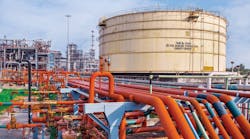Citing rising gasoline prices, US Sen. Charles E. Schumer (D-NY) suggested that some refiners may be keeping plants off-line as they switch to summer fuel blends to push prices even higher.
The senator also cited crude oil costs in an Apr. 18 letter to Federal Trade Commission Chairwoman Deborah P. Majoras asking for an investigation. But he said refining capacity utilization, which oil companies can control, has recently been below the 90% range that it has been for this period in the last 5 years.
“Given the past behavior of the oil companies who take advantage of natural or cyclical occurrences and raise prices even more than necessary, this requires scrutiny,” Schumer said as he released the letter.
He told Majoras that “only 85%” of the total US refining capacity was used in the week ended Apr. 7, and finished motor gasoline production fell to 7.8 million b/d. Refinery utilization averaged 86.7% of total capacity during March, the American Petroleum Institute said in its latest monthly statistical report.
Fuller utilization can assure that consumers pay lower prices, Schumer said, noting that fuel prices averaged $1.065/gal when US refining capacity utilization averaged 98.1% between April and September 1998.
“While a temporary drop in capacity may be appropriate, the FTC should carefully monitor oil companies to ensure they return to full capacity as quickly as possible,” he said in his letter to Majoras.
Hurricane impacts
Oil industry trade associations immediately responded that between 3% and 5% of domestic refining capacity remains inoperative because of damage from Hurricanes Katrina and Rita last year.
Three refineries, with a combined capacity of 804,000 b/d, remain closed, API said in a statement.
In a separate statement, Bob Slaughter, president of the National Petrochemical & Refiners Association, said, “The 98% utilization figure cited by the senator is more typical of refinery utilization in the midst of the summer driving season, not in April. And, of course, few industries operate at the high utilization rates typical of US refineries.”
API said Schumer also may have failed to consider the rapid increase this year in the blending of ethanol into reformulated gasoline, a result of a congressional mandate and refiners’ switch away from methyl tertiary butyl ether.
Refineries also are undergoing routine maintenance that had to be delayed because of the 2005 hurricanes, API added.
NPRA’s Slaughter said capacity additions at existing US facilities over the last decade have been the equivalent of a new refinery each year. “Plans to increase US capacity by over 1 million b/d have been widely discussed by the industry in public forums, including the press,” he added.
